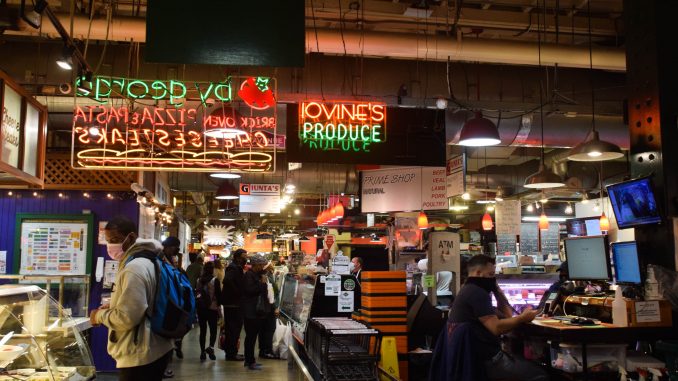
As one of America’s largest and oldest public markets, Reading Terminal Market is an iconic Philadelphia landmark, accommodating nearly 80 merchants for 127 years.
But not even the marketplace can escape the economic consequences of the COVID-19 pandemic. A GoFundMe page was created by the market on Oct. 7 to save it from having to shut its doors. The page raised almost $200,000 of its $250,000 goal in a little more than three weeks.
In Philadelphia, 38 restaurants have closed between May and October as a result of COVID-19, Eater Philly reported.
Temple University students should be concerned by the number of eateries in Philadelphia closing amid the COVID-19 pandemic and consider finding safe ways to support local food industries, like donating, ordering takeout or buying merchandise and gift cards.
Philadelphia residents and students rely on the market for buying groceries.
Joey Berkant, a junior architecture major, frequently visited Reading Terminal Market for his Engaging Places: Observations course. The class’s purpose was to introduce students to the study of buildings and public places in Philadelphia.
“By the time I was there, I could do my grocery shopping,” Berkant said. “I really like the products they have there.”
Emani Howard, a freshman secondary education and history major, said the diverse vendors at Reading Terminal Market made it a comfortable and enjoyable environment to explore.
“It was a nice space to come to,” Howard added. “We used to go there every Friday and get whatever was open because there’s a lot of different things.”
Some of these immigrant- and family-owned vendors at Reading Terminal Market have been in business for decades. The market has a variety of cultural cuisines, including Italian, Cajun, Middle Eastern, Caribbean, Spanish, Thai, Latino, Chinese and Japanese food.
Temple prides itself on being a diverse school, distinguished by its self-starting student body. Its students should be driven to preserve local businesses for future students to experience, said Ryan Oliviera, a 2013 management information systems alumnus.
“The local food scene is a by-product of Temple being in the city,” Oliviera added. “You can explore cultures by eating your way through it. It fits perfectly with Temple, where you have people from all different backgrounds coming into this environment.”
Oliviera founded a start-up project, “Support Local,” along with 15 other Temple students. They created a directory and partnered with local food bloggers, demonstrating their school spirit.
The COVID-19 pandemic has worsened the financial crisis in Philadelphia, as the city’s commerce budget was cut by 63 percent. Independent businesses are the backbone of Philadelphia and promote economic equality and environmental sustainability, WHYY reported.
The cost of losing these businesses far outweighs the cost of keeping them.
When I was applying to colleges, I was attracted to Temple because of the exposure to countless cultural dishes, which I couldn’t find in the suburbs. Students can leave an impact by providing much needed aid to these small businesses, like Reading Terminal Market.
If these businesses continue to shut down, not only will the city lose many dining options, but it will also lose its charm.
“The local restaurant scene is what gives Philly its identity,” Oliviera said. “I’ve lived here for 11 years, including my Temple years, and I still haven’t eaten my way through my bucket list.”


Be the first to comment